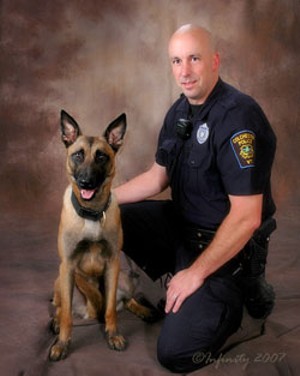Published March 11, 2009 at 9:56 a.m.
On December 20, 2007, Vermont State Trooper Eugene Duplissis and his canine partner, Niko, were called in to help search for a 9-year-old girl who disappeared during an evening snowstorm. Shortly after their arrival, Niko tracked the girl from her home to a wooded snow bank three-quarters of a mile away, where she was found lying in a fetal position, nearly frozen. Niko was credited with saving the girl’s life.
A few weeks ago, Niko was forced to retire unexpectedly when a compression lesion on his spine left him “ataxic,” or unable to walk properly. Already, his veterinary bills total more than $3000. But, unlike with a law-enforcement officer who is disabled in the line of duty, the cost of caring for a retired police dog in Vermont is almost invariably borne by its handler.
Paul Howard, a veterinarian with the Vermont Veterinary Surgical Center in Colchester who treats many local police dogs, didn’t think that was right. So he decided to do something about it. With help from his friends Kirk and Loretta Walters of Shelburne, “Lacey’s Fund” was born. Named after the Walters’ family dog that died last year, the private nonprofit fund helps pay for police canines’ medical care so they can live out the remainder of their lives in relative comfort.
Currently, there are 38 working police dogs in Vermont, according to David Dewey, a Colchester police officer and president of the Vermont Police Canine Association. Although most police departments in the state take good care of their active-duty animals, including paying for their food and vet bills, Dewey says that not all municipalities can afford to do so. Moreover, many of the other expenses related to police canines, including acquiring and training them as puppies, caring for injuries incurred off-duty, and post-retirement care, are typically the handlers’ own responsibility.
Retired police dogs don’t just suffer from the normal ailments associated with aging but also the serious wear and tear that comes from years of rigorous training and working, including arthritis, hip and knee injuries, torn ligaments, and back and spinal problems. As Dewey puts it, “The surgeries these dogs need are not the result of being couch potatoes.”
In fact, it was Dewey’s previous canine, Kilo, a drug dog with the Colchester Police Department, that was the impetus behind Lacey’s Fund. In November 2006, Kilo, a 110-pound German shepherd, developed a knee problem that required routine surgery. But unbeknownst to Dewey or Howard, his vet, Kilo’s leg had become seriously infected. As a consequence, Kilo died unexpectedly on the operating table.
Kilo’s untimely death was a serious blow to both Dewey and Howard. Shortly thereafter, Howard introduced Dewey to Kirk Walters, who offered to pay for Kilo’s successor. Walters, an airplane pilot, even flew them out to Ohio to pick up the puppy. Tazor, a Belgian Malinois, now works with Dewey at the Colchester PD.
In February 2008, after Walters lost his own family dog, Lacey, a 13-year-old yellow Lab, he and his wife were looking for a way to honor her memory. After discussing it with Dewey and Howard, Lacey’s Fund was born. The Walters made a “significant contribution” of their own, as did Walters’ employer at the time, the Chittenden Bank. (Walters now works as chief financial officer for Sovereign Bank in Boston, which also supports Lacey’s Fund.)
“We’re trying to help out wherever we can, so these dogs can have a comfortable and happy retirement,” Walters says. “The goal is to be that financial backstop when something large comes up.”
Admittedly, Lacey’s Fund cannot afford to cover all the medical expenses for retired police dogs; an advisory board decides on a case-by-case basis which ones it should help. Still, since it was established, Lacey’s Fund has already assisted three retired police dogs.
Ultimately, both Howard and Dewey hope to establish a more permanent funding stream so that all of the state’s canine cops are covered in their declining years. As Dewey puts it, “People don’t always like us, but they do like our dogs.”
Want to help?
For more information on Lacey’s Fund, or to make a tax-deductible contribution, visit the Vermont Police Canine Association website, www.vtpca.com, and click on “Lacey’s Fund.”
2009 Animal Issue
This story was part of our 2009 Animal Issue. Click here for more animal stories.
More By This Author
Speaking of...
-

Totally Transfixed: A Rare Eclipse on a Bluebird Day Dazzled Crowds in Northern Vermont
Apr 10, 2024 -

Dick Mazza Steps Down From Vermont Senate
Apr 8, 2024 -

Thingz From Yaad Brings Jamaican Cuisine to a Former Dining Hall in Colchester
Apr 2, 2024 -

Approaching Three Decades, Shelburne’s Dutch Mill Diner Gets a Refresh
Mar 12, 2024 -

Electra's Restaurant in Shelburne Has Something for Everyone
Mar 5, 2024 - More »
Comments
Comments are closed.
From 2014-2020, Seven Days allowed readers to comment on all stories posted on our website. While we've appreciated the suggestions and insights, right now Seven Days is prioritizing our core mission — producing high-quality, responsible local journalism — over moderating online debates between readers.
To criticize, correct or praise our reporting, please send us a letter to the editor or send us a tip. We’ll check it out and report the results.
Online comments may return when we have better tech tools for managing them. Thanks for reading.













































